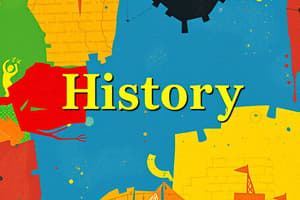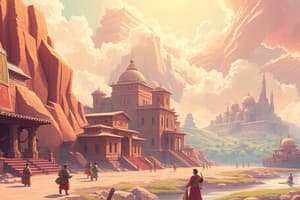Podcast
Questions and Answers
Which period is characterized by the rise of early civilizations and the development of writing?
Which period is characterized by the rise of early civilizations and the development of writing?
- Classical Antiquity (correct)
- Ancient History (correct)
- Middle Ages (correct)
- Prehistoric Period (correct)
The Renaissance was marked by a decline in art and scientific achievements.
The Renaissance was marked by a decline in art and scientific achievements.
False (B)
Who is often referred to as the 'Father of History'?
Who is often referred to as the 'Father of History'?
Herodotus
The study of historical writing and perspectives is known as __________.
The study of historical writing and perspectives is known as __________.
Match the following periods of history with their characteristics:
Match the following periods of history with their characteristics:
Which concept focuses on arranging events in the order they occurred?
Which concept focuses on arranging events in the order they occurred?
Primary sources are interpretations or analyses based on original documents.
Primary sources are interpretations or analyses based on original documents.
What significant themes did Howard Zinn focus on in his work?
What significant themes did Howard Zinn focus on in his work?
The __________ is known for its cultural and scientific developments during a time of feudalism.
The __________ is known for its cultural and scientific developments during a time of feudalism.
Revisionist history seeks to interpret established narratives based on what?
Revisionist history seeks to interpret established narratives based on what?
Flashcards are hidden until you start studying
Study Notes
Definition of History
- Study of past events, particularly in human affairs.
- Encompasses various aspects: political, social, economic, cultural, and technological developments.
Importance of History
- Helps understand how past events shape the present and future.
- Provides context for current social and political structures.
- Encourages critical thinking and analytical skills.
Major Periods in History
-
Prehistoric Period
- Time before written records.
- Study of artifacts and human activities.
-
Ancient History
- Emergence of early civilizations (e.g., Mesopotamia, Ancient Egypt, Indus Valley).
- Development of writing, agriculture, and urbanization.
-
Classical Antiquity
- Rise of empires (e.g., Greece, Rome).
- Advancements in philosophy, governance, and arts.
-
Middle Ages
- Feudalism, the rise of Christianity and Islam.
- Cultural and scientific developments in various regions.
-
Renaissance
- Revival of art, literature, and learning; focus on humanism.
- Significant advancements in science and exploration.
-
Modern History
- Industrial Revolution, colonization, and globalization.
- Notable events: World Wars, the Cold War, and post-colonial movements.
Key Concepts in History
- Chronology: The arrangement of events in the order of their occurrence.
- Historiography: The study of historical writing and perspectives.
- Primary and Secondary Sources:
- Primary: Original documents or artifacts from the time being studied.
- Secondary: Interpretations or analyses based on primary sources.
Methods of Historical Research
- Analysis of documents: Letters, official records, newspapers.
- Oral histories: Interviews with individuals about their experiences.
- Archaeology: Study of artifacts and structures to gain insights into past societies.
Notable Historians
- Herodotus: Often called the "Father of History."
- Thucydides: Known for his work on the Peloponnesian War.
- Edward Gibbon: Famous for "The History of the Decline and Fall of the Roman Empire."
- Howard Zinn: Focused on the perspective of marginalized groups in "A People's History of the United States."
Historical Perspectives
- Different interpretations (e.g., political, economic, social) influence how history is perceived.
- Revisionist history seeks to reinterpret established narratives based on new evidence or perspective.
Tips for Studying History
- Focus on understanding cause and effect of events.
- Make timelines to visualize historical developments.
- Compare different sources for a well-rounded view.
- Engage with diverse perspectives to enhance understanding.
Definition of History
- History is the study of past events, primarily focusing on human affairs.
- It delves into various aspects, including political, social, economic, cultural, and technological developments.
Importance of History
- Studying history helps us grasp how past events shape the present and impact the future.
- It provides context for understanding current social and political structures, offering valuable insights.
- History encourages critical thinking, analytical skills, and a deeper understanding of the world around us.
Major Periods in History
Prehistoric Period
- The time before written records, relying on artifacts and human activities for insights.
Ancient History
- The rise of early civilizations, such as Mesopotamia, Ancient Egypt, and the Indus Valley.
- This era saw the development of pivotal innovations including writing, agriculture, and urbanization.
Classical Antiquity
- The rise and influence of powerful empires, including Greece and Rome.
- This period witnessed significant advancements in philosophy, governance, and the arts.
Middle Ages
- Characterized by feudalism, the rise of Christianity and Islam, and cultural/scientific developments across various regions.
Renaissance
- A period of revival in art, literature, and learning, with a strong emphasis on humanism.
- The Renaissance saw significant advancements in science and exploration.
Modern History
- Marked by the Industrial Revolution, colonization, and globalization.
- This era encompassed notable events such as the World Wars, the Cold War, and post-colonial movements.
Key Concepts in History
- Chronology: The sequence of events placed in their order of occurrence.
- Historiography: The study of historical writing and perspectives, encompassing different interpretations and methods.
- Primary and Secondary Sources:
- Primary Sources: Original documents or artifacts directly from the time period.
- Secondary Sources: Interpretations or analyses based on primary sources.
Methods of Historical Research
- Analysis of documents: Letters, official records, newspapers, and other primary historical documents.
- Oral histories: Interviews with individuals about their experiences and perspectives.
- Archaeology: Examination of artifacts and structures to gain insights into past societies.
Notable Historians
- Herodotus: Often recognized as the "Father of History" for his influential contributions.
- Thucydides: Known for his meticulous historical account of the Peloponnesian War.
- Edward Gibbon: Famous for his comprehensive work, "The History of the Decline and Fall of the Roman Empire."
- Howard Zinn: A prominent historian known for "A People's History of the United States," which highlights the experiences of marginalized groups.
Historical Perspectives
- Different interpretations, including political, economic, and social viewpoints, shape how history is perceived.
- Revisionist history aims to reinterpret established historical narratives based on new evidence or perspectives.
Tips for Studying History
- Focus on understanding the cause and effect relationships between historical events.
- Create timelines to visualize historical developments and their sequence.
- Compare different sources to gain a balanced and multifaceted view.
- Engage with diverse perspectives to deepen your understanding of historical events.
Studying That Suits You
Use AI to generate personalized quizzes and flashcards to suit your learning preferences.




